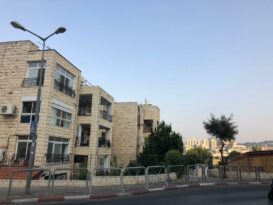The Bank of Israel has drafted a restriction that will prevent buyers from taking out loans to supplement their equity when purchasing a new apartment through a lien on an existing property. This move would be particularly detrimental to those trying to buy an apartment for investment or home improvement purposes. The goal appears to be to slow the rising demand for apartments and the sharp jump in real estate prices in recent years. Ironically, just six months ago, the Bank of Israel approved a different decision that increased demand.
Last week, the Bank of Israel published a draft for public comment that indicates that the country’s central bank is trying to cool down Israel’s burning housing market. If passed, the decision will prevent homebuyers from taking out equity loans to purchase an apartment through a lien on an existing apartment. This is a common strategy for both those borrowing for investment and for home improvement. Although the decision is not yet final, assuming nothing out of the ordinary happens, it would likely become binding.
The decision would limit the leverage for those buying any property that is not their first apartment. Today, investment buyers can take out a mortgage that covers up to 50% of the price of the apartment, providing the rest as equity. In order to reach the required equity, many buyers either take out an additional loan or increase an existing mortgage on a property they already own. The Bank of Israel intends to put an end to this practice.
However, if the decision is approved, homebuyers who are borrowing for investment purposes will not be the only victims. This type of financing is also often used by those who want to improve their living conditions, but do not own more than one residential apartment. The current law allows a buyer to purchase a new property before the old one is sold, without considering the second purchase as an investment property, provided that the homeowner does not hold the two apartments simultaneously for more than a year and a half. In order to raise the capital required to purchase the second property, the buyer often needs to take out an additional loan based on the existing asset.
The fact that the proposal is also expected to hurt the home improvement sector has led to criticism in the Israeli economic press. While most accept the need to restrict investors in a period of rising real estate prices, this is not the case when it comes to homeowners that simply want to improve their standard of living and do not own more than one apartment.
Meanwhile, the demand for apartments in Israel is breaking records. The day after the Bank of Israel published the draft, the Ministry of Finance published data regarding real estate transactions so far this year: 11,000 apartments were purchased by the Israeli public in April – an all-time high for this month – and a total of 44,000 apartments were purchased in the first third of 2021. If this rate continues, there will be 130,000 transactions this year, compared to an average of 100,000 in recent years. Apartment prices also continue to climb, jumping by 5.6% in the last year alone.
The Bank of Israel is hoping to slow the demand in the market, which is ironic, considering that the central bank recently made a decision that actually fueled this trend. In December of last year, the Bank of Israel raised the limit on the prime interest rate component of mortgages. This was the component with the cheapest interest rates, which was previously limited to a third of the total loan. According to the bank’s decision, buyers could increase this component from one-third to two-thirds, thus significantly reducing the cost of the mortgage.
So just six months after approving a decision that encouraged demand for apartments through a reduction in mortgages, the bank is now promoting a move that is designed to suppress demand through toughening conditions for those borrowing for investment. A likely explanation for this questionable process is that in November/December when the decision was made to remove the restrictions on the prime component of mortgages, the real estate market was still in the midst of the crisis that emerged from the Covid-19 pandemic. Now, slightly shocked by the increase in demand that it helped fuel, the Bank of Israel is trying to put out the fire.








